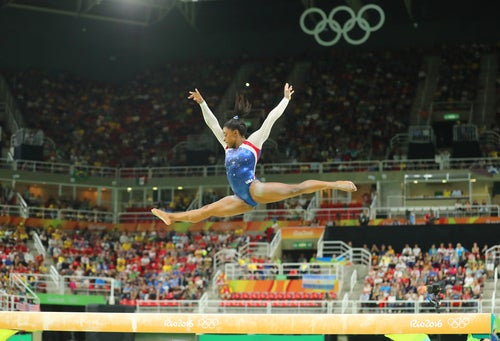She barrels down the mat like a sprinter, pivots, soars into the air backwards with two somersaults and a half twist, and lands blindly and perfectly on her feet, with arms outstretched and an irrepressible smile. It is an acrobatic feat of such difficulty, grace and poise by the 19-year-old, four feet eight gymnast Simone Biles, that it has come to be known as “the Biles.” And along with other seemingly impossible maneuvers on the vault, balance beam and uneven bars, it has sealed her reputation as the greatest gymnast ever, with three straight World Championships and four gold medals at the Rio de Janeiro Olympics.
Numerous articles and Bile’s own comments attribute that success not only to singular athletic talent but also to parents who gave her love, support and self-confidence from an early age. But it did not begin that way. Biles had an unstable, rough-and-tumble first few years, and, but for timely intervention, might easily have led a life of shattered dreams and untapped potential.
Biles is living proof that good parenting matters, a finding supported by extensive research in the IDB’s flagship study, The Early Years: Child Well-Being and the Role of Public Policy. The book differentiates a house from a home and a school building from a learning center; the physical attributes of the structure are secondary to the nurturing, support and guidance of parents, teachers, and other caregivers. Children need an atmosphere where adults talk to and read to them, stimulating the development of their language and cognition. Parents must be encouraging and responsive to help children reach their potential, all while providing a physically safe and secure environment. These qualities, measured in a scale known as the Home Observation for Measurement of the Environment (HOME), have been linked to better development outcomes for children.
The IDB is not alone in highlighting the role parents play in developing happy, healthy, productive youngsters in general, and Olympic champions in particular. In the run-up to Rio, Proctor & Gamble partnered with athletes and their mothers in 21 countries to launch its Thank You Mom campaign, featuring the video, Strong. The message: when it comes to mustering the strength to compete on the world’s greatest athletic stage, many athletes draw upon the strength instilled in them by their mothers.
Many of the conditions outlined in the IDB study and dramatized in the P&G video seem to have been missing in Biles’ first years. While the Biles family has been relatively guarded in their comments to the press, what is known is that Biles was born in Texas to a drug-addicted mother and a father who abandoned the family early on. She was placed in foster care when she was two, and bounced from one foster home to another until she was six, when her grandfather and his second wife adopted her and a sister as their own. The adoption made all the difference. Her new parents lived in a well-to-do suburb of Houston. Her new mother was a retired nurse who was born in Belize; her new father had a good job with the Federal Aviation Administration. Together, according to an article in the New York Times, they provided her with a nurturing and warm home with the discipline and goals that allowed her to flourish. The icing on the cake was the adoptive country that her new parents introduced to Simone, who has spent considerable time in Belize. And the feelings are mutual. Simone’s fondness for Belize is more than reciprocated by her adoptive countrymen who have taken great pride in her success in Rio. In fact, the Belizean government has extended an invitation to the entire US women’s gymnastics team.
Most children from disadvantaged families, of course, will not have Biles’ luck in being plucked from a harsh environment to such a bounteous one. It is to say the least, an unusual story. Nonetheless, there are many things governments can do to help parents become better providers and create the conditions that help young children thrive and reach their potential much as Biles has done.
In Latin America, they can begin by spending more on their youngest citizens. For every dollar spent on children under 5 years of age, three dollars is spent on children aged 6-11. But how that money is spent is even more important than how much is spent. Parenting programs, involving home visits and other interventions by social workers and counselors, have proven effective in making each dollar count. Not only have these programs taught parents how to improve breastfeeding practices and nutrition. They have helped them increase their children’s mental abilities, social skills, and employment potential. In a famous program implemented in Jamaica, for example, health workers visited the homes of malnourished children aged 9-24 months in the poorest neighborhoods of Kingston for an hour a week over two years. During the visits, as recounted in a recent blog, they showed parents how to use homemade toys and picture books to teach words, as well as basic concepts, like colors and numbers. By the end of the program, children not only had significantly higher cognitive development scores than a control group. They went on 20 years later to have higher IQs, educational levels, and incomes, as well as better mental health than the control group.
Governments will never create superstars like Simone Biles. Innate talent cannot be produced. Nor can governments substitute for parental love and dedication. But they can provide resources for basic needs, help people learn to be better parents, and if programs are well-designed, do so with real results for the investment. Good homes are where it all begins, where strong personalities, intellects and even athletic skills are forged. The key to a creative and productive society is ensuring that most people, at least, grow up in one.


Leave a Reply